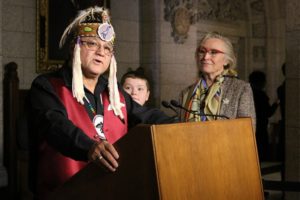Bill C-61 receives Royal Assent

ANISHINABEK NATION HEAD OFFICE, Nipissing First Nation (December 15, 2017)—On behalf of the Anishinabek Nation, Grand Council Chief Patrick Madahbee would like to extend congratulations to the 23 Participating First Nations and the Kinoomaadziwin Education Body (KEB) on the Royal Assent of Bill C-61, the Anishinabek Nation Education Agreement Act.
“I am elated that Deputy Grand Council Chief Glen Hare, KEB Board members, and technical support staff successfully steered this historic bill through the final stage of Canada’s Legislative process,” said Anishinabek Nation Grand Council Chief Patrick Madahbee. “For so long, having our own education system was a dream, but today, we take a step forward on our journey to building a better education and realizing a better future for our Anishinabek youth.”
Bill C-61 underwent Canada’s Legislative process, having passed both the House of Commons and the Senate in identical form, and most recently, receiving Royal Assent by written declaration in order to make the bill a law. Bill C-61 is now an Act of Parliament and Chapter 32 in the Statutes of Canada 2017.
On December 12, 2017, Bill C-61 was before the Senate for its First and Second Reading. An Anishinabek Nation contingency, which included the Anishinabek Nation Deputy Grand Council Chief Glen Hare; Anishinabek Education System (AES) Education Director Kelly Crawford; and two KEB board members, Lisa Michano and Evelyn Ball, were there to support the question period of the bill. The Senate debated the bill and passed the bill on the Third Reading on December 13, 2017.
The Anishinabek Nation Education Agreement is an important step out from under the Indian Act toward greater self-determination for the Participating First Nations. Under the Agreement, the Participating First Nations will create the AES. The Agreement recognizes Anishinabek law-making powers and authority over education on and off reserve from Junior Kindergarten to Grade 12, as well as administrative control over funding for post-secondary education.
The next steps are to continue supporting the Participating First Nations in preparation for the target effective date of April 1, 2018, for the AES to be operational.
The Anishinabek Nation Education Agreement is the largest education self-government agreement in Canada, and the first of its kind in Ontario.


